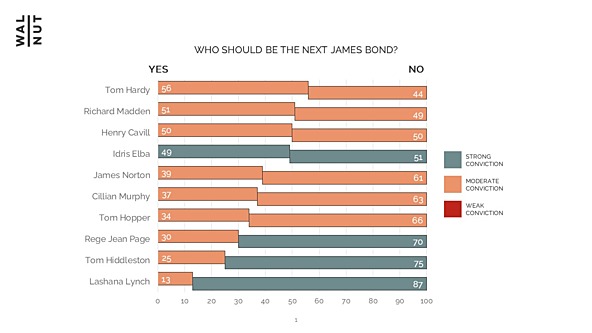Implicitly Bond: reaction time testing and the next 007

The mantle has been passed from household names like Sean Connery and Roger Moore through to the latest 007, Daniel Craig. But who do we as a nation believe should pick up the baton? It’s our belief that you cannot get an accurate answer to this question explicitly, so we applied Reaction Time Testing in order to understand the nation’s emotional attitudes towards those in the pool of actors and actresses touted to be the next Bond.
Reaction Time is an implicit tool that captures an additional, deeper level of insight; allowing us to look not only on declarative answers, but also how certain people behaved when giving their answers. The faster their responses, the stronger the attitudes. This insight into the emotional side of opinions provides a more accurate perspective on how the respondents truly feel. And this is what we learned…
It’s not always about preference
When we launched this survey, we expected to see some strong preferences. We were, however, surprised to see that Brits have stronger opinions about who shouldn’t be the next Bond, rather than who would be best for this role.
When suggesting actors for the lead role, we see some strong “no” answers across the board, but only moderate certainty in terms of “yes” answers. These implicit insights show that the audience haven’t made up their minds yet and are open to suggestion. We discovered that the negative attitudes given were pretty strong, whereas affirmative answers are moderate at best.
In among this data, we found answers to some big questions: are we ready for a female James Bond? Can a notorious villian play the role of the most famous British secret agent? Do younger and older audiences share the same attitudes? Let’s look at the data to understand these questions further.

Battle of the Bonds
Unfortunately, it seems the nation is not ready for a female Bond. 87% of respondents said Lashana Lynch should not be the next James Bond, and they really meant it according to Reaction Time measurements. This attitude is even stronger among viewers 55+. With Lynch being the only female in the running according to bookmakers, it’s difficult to tell whether this is a reflection on Lynch or women in general. Could this be an emotional cry to stand by tradition? Either way, it’s a Dr No for Lashana Lynch.
Compared to Lynch, only slightly higher scores were received by Tom Hiddleston and Regé-Jean Page. It is understandable that the actor well known for playing Loki, a notorious villain, would not feel like an immediate fit for the new James Bond in British hearts, but why not Regé-Jean Page? This data is even more surprising knowing that Regé-Jean Page dominates in the Bond betting odds.
In his case, the strongest emotional rejection was expressed by the male audience. Females were also not in favour of him, hence his low ranking, but their rejection was significantly less negative. Perhaps this skew is reflective of the Bridgerton viewing audience, to which Regé-Jean owes his rise to fame.
We’ve been expecting you, Mr Bond
When we look at the top picks, we see that affirmative answers for the top four contenders are very close. At an emotional level, Idris Elba is winning. But the data shows he is a truly polarising persona. We observe strong conviction in both those for and against the idea of him taking on the role, showing a strongly divided audience. He has some dedicated followers, but at the same time some passionate haters. Does this make him a good choice? Appointing him would certainly draw the highest amount of emotional reaction, both good and bad – the franchise could do well in terms of publicity as a result.
The other top three spots belong to Tom Hardy, Richard Madden and Henry Cavill. Hardy is slightly ahead, but the emotional conviction behind all these options is rather low. It shows that the general population do not have strong opinions regarding these actors, and they could be persuaded to accept any of them. It is true, however, that Hardy wins the hearts of those across most age groups (across 18-54 ) and is equally appreciated by both men and women, but Idris Elba remains the firm favourite among women.
A lesson for the world of research
The results from this implicit study show that even amongst people who are happy giving their opinion in the moment, in many cases these attitudes are not strong and certainly not always fixed.This is why researchers should seek to reach beyond declarations whenever we can. We need to remember that conscious declarations are only part of the story that can be complemented with additional implicit perspectives.
This will increase the accuracy of our predications and the conviction in the results we gather – whether it’s interpreting who the next Bond may be, or in our approach to delivering insights for our clients. Conscious declarations are only a part of the story; they are important, but they do not show the full picture.
Michal Matukin is a research director at Walnut Unlimited

We hope you enjoyed this article.
Research Live is published by MRS.
The Market Research Society (MRS) exists to promote and protect the research sector, showcasing how research delivers impact for businesses and government.
Members of MRS enjoy many benefits including tailoured policy guidance, discounts on training and conferences, and access to member-only content.
For example, there's an archive of winning case studies from over a decade of MRS Awards.
Find out more about the benefits of joining MRS here.











0 Comments